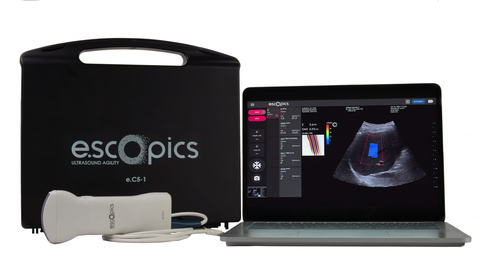AIX-EN-PROVENCE, France– E-Scopics, the France-based medical ultrasound company and creator of a unique software-based liver assessment tool, welcomed the announcement that Madrigal Pharmaceuticals’ Rezdiffra™ (resmetirom) has been approved by the U.S. Food and Drug Administration (FDA) to treat certain forms of liver disease. This is a timely and exciting development in the fight against metabolism-related liver disease, which is on the rise globally. It follows another exciting advance in the same fight: the FDA clearance, CE mark, and full commercialization of the Hepatoscope®, a point-of-care, software-based ultrasound application that can be used to identify, prioritize, and monitor the patients who will benefit most from Madrigal’s new drug.
Approximately 1.5 million patients have been diagnosed with metabolic dysfunction associated steatohepatitis (MASH) in the U.S., and it is estimated that the precursor to MASH—metabolic dysfunction-associated steatotic liver disease or MASLD—will affect more than half of all American adults by 2040. The MASLD spectrum ranges from a simple, generally nonprogressive fat buildup in the liver all the way to MASH, which can lead to cirrhosis, hepatocellular carcinoma, and death. The economic burden attributed to effects of MASLD in the U.S. exceeds $100 billion annually.
The development of fibrosis in patients with MASLD is associated with major adverse liver outcomes and liver-related mortality, so identifying patients with fibrosis is a crucial step in getting them effective treatment. Rezdiffra can be prescribed in patients assessed with fibrosis stages F2 to F3 without a liver biopsy. However, patients with fibrosis level F2 to F3 still have to be identified, and Liver Stiffness Measurement (LSM) is the non-invasive exam of choice for this identification. E-Scopics’ Hepatoscope uses imaging guidance and image processing software to enable any healthcare professional to obtain accurate, reproducible LSMs at the bedside. These measurements, along with the Hepatoscope’s visualization of other tissue properties, can help physicians with the diagnosis, monitoring, and clinical management of adult and pediatric patients with liver disease.
Commenting on the Rezdiffra news, Dr. Naim Alkhouri, Chief Medical Officer and Director of the Steatotic Liver Disease Program at Arizona Liver Health in Phoenix, observed, “Because MASLD is so widely underdiagnosed, the Hepatoscope is also a part of this story. Getting point-of-care ultrasound to more frontline clinicians—and having that tool generate a liver scan automatically—will help us identify patients who should be referred to hepatologists. By assessing patients at risk and referring those who need it, we can better organize the MASLD-MASH patient care pathway to capitalize on breakthroughs like these.”
Dr. Edward A. Mena, President and CEO of the California Liver Research Institute and of the Pasadena Liver Center was impressed with the results of Madrigal’s clinical trials and thrilled to learn about the FDA approval. “Rezdiffra comes at a critical time for liver care,” he observed. “Medication that can reverse some of the worst impacts of MASH will be a huge help to our patients. The Hepatoscope is the necessary diagnostic complement to this revolutionary new treatment, as it will help us identify more patients who stand to benefit from it.”
“There are millions of individuals with undiagnosed MASH,” said Dr. Julio Gutierrez, Associate Professor of Medicine at Scripps Center for Organ Transplant in La Jolla, CA. “Having an FDA-approved therapy will signal to patients and providers that there are care options. Point-of-care devices like the Hepatoscope, which can be used to quickly triage patients in the clinic, is a key element in how we will handle the avalanche of patients.”
This kind of direct impact was exactly the goal when E-Scopics selected the Hepatoscope as its platform’s first application, said Claude Cohen-Bacrie, the company’s Founder and CEO. “We knew that MASLD was on the rise globally, and recognized that the medical community needed less expensive, more portable, easier-to-use tools to accurately screen for the disease. The Hepatoscope application can be loaded onto a consumer laptop or tablet, and our Ultrasound-as-a-Service model means any clinic can get access to this premium ultrasound technology via an affordable monthly or pay-per-use subscription. Questions of access matter more than ever,” he concluded, “as patients stand to benefit from these newer, more effective forms of treatment.”


